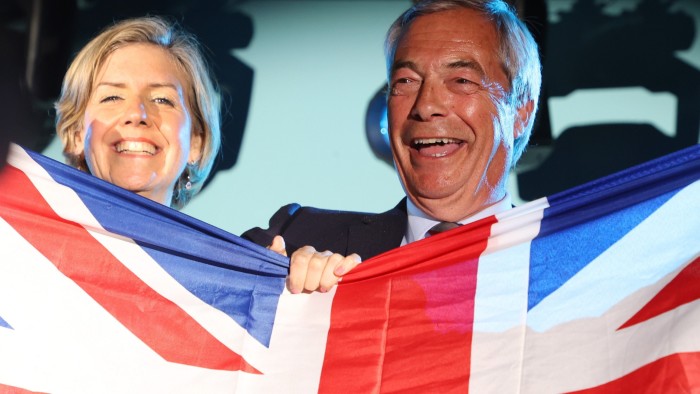Labour and the Conservatives are scrabbling to find a way to deal with Reform UK after Nigel Farage’s insurgent populist party inflicted a day of electoral destruction on Britain’s two main parties.
Farage declared the “end of two-party politics” in Britain after Reform dismantled Labour’s northern strongholds and annihilated the Tories in their former shire heartlands in England’s local elections.
Reform also claimed a narrow victory over Labour in the Runcorn and Helsby parliamentary by-election.
Overall Reform gained 677 council seats, the Lib Dems 163 and Greens 45 while Labour lost 186 and the Conservatives lost 676.
The results, along with national opinion polls that have given Reform a narrow lead for several months, undermine the status quo under which Labour and the Conservatives have taken turns in power for the past century.
The local elections also suggest that Reform threatens a populist insurgency in Britain similar to those witnessed in the US, France, Italy and Germany.
Former Brexit pioneer Farage, who has boasted of his friendship with US President Donald Trump, has vowed to axe carbon targets, introduce a tougher clampdown on immigration and take on “liberal elites”. He has also promised to take greater state control of utilities such as the water industry and steelmakers.
Sir Keir Starmer, the Labour prime minister, said he would not use the “same old excuses” — such as the low turnout of local elections — for the set of results. “My response is simple: I get it,” he said.
In an editorial in the Times newspaper, Starmer promised “hard graft” to deal with the big issues, from improving the NHS to tackling “uncontrolled immigration, sewage in rivers, failing local services”.
But in a veiled message to those who had voted Reform, he said it was wrong to think that there was an easy solution to Britain’s problems.
“I also know that there will be people who respond to these results by claiming that there is some simple, ideological fix. That if only we did what they say, everything would be sorted overnight,” he said. “I am afraid this is wrong. Britain has tested to destruction the idea of ripping up fiscal rules or promising unfunded spending.”
Kemi Badenoch, leader of the Conservatives, faces an even greater challenge. The party is trapped in a vice with Reform winning over swaths of Tory supporters while the Lib Dems captured liberal Conservative votes in the south and west.
She admitted it had been a “bloodbath” for her councillors after the Tories’ “historic defeat” in July’ s general election after 14 years in government.
“I’m deeply sorry to see so many capable, hard-working Conservative councillors lose their seats. They didn’t deserve it — and they weren’t the reason we lost,” she wrote in the Daily Telegraph.
Badenoch has struggled to attract national attention after winning the Tory leadership and has been criticised for her gradual approach to setting out policy.
She is under intense pressure to come up with policies to underpin her flailing leadership. “She’s on the clock,” said a veteran party official, although most Tory MPs recoiled from the idea of ousting Badenoch after only six months in office. “We’d look ridiculous,” said one shadow minister.
Richard Fuller, party chair, told the BBC that his party needed to “think deeply” about Britain’s challenges before coming up with a new list of policies.
But he said the Tories were not totally bereft of policies. For example, they had dropped Britain’s Net Zero 2050 target to ease the pressure on businesses.
Fuller admitted that the results showed that voters were still not prepared to say “we’re ready to trust you again”.
He added that Reform would soon discover it could no longer just “point” from the sidelines.
“Reform will find out, I think, that there are no simple answers locally to public finances at local government level, they’ll have to make some difficult choices and the local public will . . . hold them to account for the decisions they make,” he said.
Reform, which has never run a local authority, emerged at the weekend with control of 10 councils in Derbyshire, Kent, Lancashire, Lincolnshire, Nottinghamshire, Staffordshire, Doncaster, North Northamptonshire, Durham and West Northamptonshire.
The Liberal Democrats took control of Oxfordshire, Cambridgeshire and Shropshire county councils, all for the first time, while elbowing aside the Tories to become the largest party in Devon, Gloucestershire, Hertfordshire and Wiltshire.
The BBC projected that if the results were extrapolated to a national vote share, Reform UK would have won 30 per cent, compared with Labour on 20 per cent, the Lib Dems on 17, Conservatives on 15 and Greens on 11.




